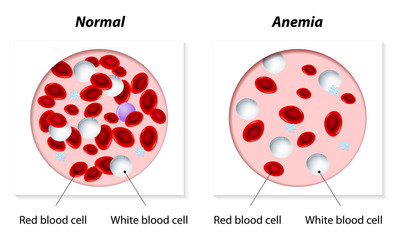Anaemia is a medical condition characterized by a reduced number of red blood cells (RBCs) or a deficiency in haemoglobin—the iron-rich protein in RBCs that carries oxygen throughout the body. When your body lacks enough healthy red blood cells or haemoglobin, the blood's capacity to transport oxygen to organs and tissues is diminished, resulting in fatigue and various health complications.
The haemoglobin concentration required to meet normal physiological needs varies depending on age, gender, altitude, smoking habits, and pregnancy status. Anaemia is not a disease in itself, but a symptom of other underlying conditions, including nutritional deficiencies, chronic diseases, or inherited disorders.
Symptoms of Anaemia
Symptoms can vary depending on the severity and cause, but common signs include:
- Persistent fatigue or tiredness
- Weakness
- Pale or yellowish skin
- Shortness of breath
- Dizziness or light-headedness
- Rapid or irregular heartbeat
- Cold hands and feet
- Headaches
- Chest pain (in severe cases)
- Poor concentration
In children, anaemia can affect growth and cognitive development. In pregnant women, it increases the risk of maternal and fetal complications.
Causes of Anaemia
1. Nutritional Deficiencies
- Iron deficiency (most common)
- Vitamin B12 deficiency
- Folate deficiency
- Vitamin A deficiency
2. Chronic or Infectious Diseases
- Malaria
- Tuberculosis
- HIV/AIDS
- Kidney disease
- Cancer
- Inflammatory diseases
3. Blood Loss
- Heavy menstrual bleeding
- Gastrointestinal bleeding (ulcers, hemorrhoids, cancer)
- Injury or surgery
- Childbirth-related bleeding
4. Bone Marrow and Stem Cell Problems
- Aplastic anaemia
- Leukemia
- Myelodysplastic syndromes
5. Inherited Conditions
- Sickle cell anaemia
- Thalassemia
Diagnosis of Anaemia
To diagnose anaemia, the following tests are commonly performed:
- Complete Blood Count (CBC)
- Reticulocyte count (to assess bone marrow function)
- Iron studies (serum iron, ferritin, TIBC)
- Vitamin B12 and folate levels
- Peripheral blood smear
- Bone marrow biopsy (in rare, severe cases)
Treatment of Anaemia
Treatment depends on the underlying cause:
1. Nutritional Supplementation
- Iron supplements (oral or intravenous)
- Folic acid tablets
- Vitamin B12 injections or tablets
- Dietary changes to include iron-rich foods (e.g., red meat, beans, spinach, lentils)
2. Managing Chronic Conditions
- Treat infections like malaria or tuberculosis
- Control of chronic inflammation or kidney disease
3. Blood Transfusion
- Used in severe or life-threatening anaemia
4. Erythropoietin-Stimulating Agents (ESAs)
- To stimulate red blood cell production in patients with chronic kidney disease or chemotherapy
5. Treatment of Genetic Conditions
- Regular transfusions
- Bone marrow transplant (in severe thalassemia or sickle cell cases)
Preventive Measures
- A well-balanced diet rich in iron, vitamin B12, and folate
- Iron and folic acid supplementation during pregnancy
- Regular screening for women and children
- Deworming in areas where parasitic infections are common
- Prompt treatment of chronic diseases and infections

